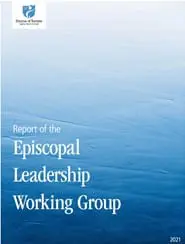Report from the Episcopal Leadership Working Group (April 2021)
In June 2020, following the announcement of the retirement of Bishop Peter Fenty, Bishop Andrew Asbil announced the formation of the Episcopal Leadership Working Group (the ELWG) with a mandate to consider and report to him on alternative models for the exercise of episcopal leadership, oversight and pastoral ministry in the Diocese. Read the Report and watch this video (see below) from Bishop Asbil.
In May 2021, Anglicans across the Diocese participated in town hall meetings to provide their feedback on the report.
Bishop Andrew's update to Synod (Nov. 2021)
Bishop Andrew provided an update on episcopal leadership in the diocese at Synod in November 2021. Having considered the recommendations and feedback, he announced that the diocese would move forward with three bishops: one diocesan bishop and two suffragan bishops. Suffragan bishops wouldn’t necessarily be appointed to geographic areas, but would engage in ministry to the entire diocese. He would appoint as many as six to eight territorial archdeacons who would offer administrative oversight to two or three deaneries each.
Bishop Andrew announced the formation of the Episcopal Leadership Implementation Team, which would create a job description for territorial archdeacons, a selection and training process, and a timeline and communications strategy for these structural changes. The co-chairs of the implementation team are Susan Abell, ODT and the Rev. Canon Stephen Kirkegaard.
Update from the Episcopal Leadership Implementation Team, June 2022
by Susan Abell, ODT and the Rev. Canon Stephen Kirkegaard, co-chairs
The Episcopal Leadership Implementation Team (ELIT) was appointed by Bishop Andrew Asbil in early 2022. It started to meet regularly in early February with an orientation from Susan Graham Walker, ODT, one of the co-chairs of the original Episcopal Leadership Working Group. ELIT is made up of a mix of clergy, diocesan volunteers and staff. We hold regular meetings online every two weeks, with the co-chairs alternating in leading the meetings.
The terms of reference for ELIT are to:
- recommend the job description, including the roles and responsibilities, for the new leadership role
- identify the implications of the new roles for the episcopal leadership structure
- recommend a selection process
A project plan, including a communication plan, is guiding how our team is undertaking this work.
What we know now
The title “archdeacon” is the one that is most familiar when identifying how the job will be known. The archdeacons will be assigned territorially to deaneries. The goal of the new role is to expand support for the bishops’ workload. Initially, the time given for the archdeacon will be one day a week, compensated with an honorarium.
Our progress so far
A detailed project plan has been developed that supports the goal of implementation by the end of 2022. A job description has been drafted for consideration by the College of Bishops. Communication strategies with key groups and stakeholders are being developed.
What comes next
ELIT perceives that there are a number of issues embedded in this work, as any system change affects the whole system or structure. The immediate goal is implementing the archdeacons as soon as possible to provide the bishops with supports and resources. Like most matters coming out of the pandemic, action is what’s needed, knowing more change will come. ELIT and the bishops are committed to sharing results and specific information about this opportunity.
New archdeacons & canon administrator announced, Dec. 16, 2022
